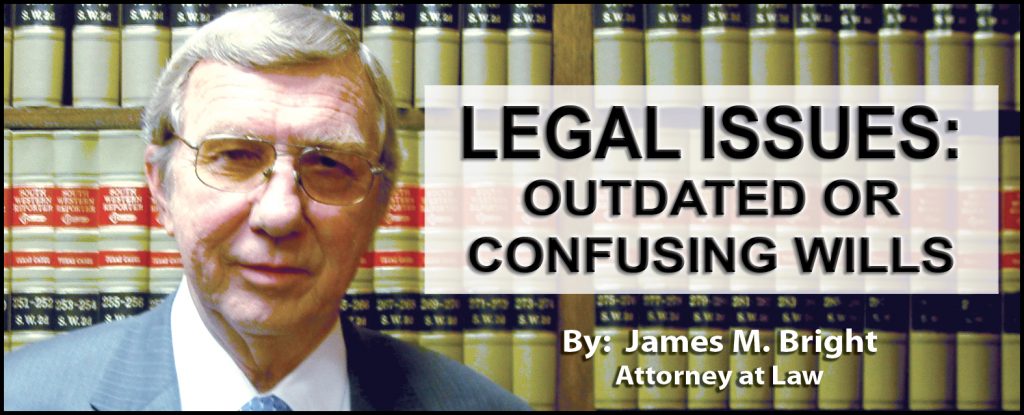The following is provided for informational purposes only and is not, nor should it be construed as legal advice.
Many persons come into my office with a request that I review Wills that were written 10-15 years ago. My initial response is usually to ask the question, “does your Will, as written, pass your property as you wish for it to pass after your death?” If the answer to that questions is yes, then you probably do not need to prepare a new Will.
Unfortunately, a large number of people to whom I speak are guessing that their Will does what was intended. They are not certain because many do not understand the language used in the Will.
Most attorneys write a Will as if they are making a legal argument to the court in the unlikely event that this particular Will should ever be contested. This is an important concept if the Will is to withstand the possible scrutiny of attack and the resulting court ruling. The attorney’s first duty in preparing your Will is to make certain that it expresses your exact intent as you wish to have your property pass in the event of your death, and that your wishes are not thwarted by a possible attack.
The problem with making sure that the Will is upheld is that it sometimes ends up using language that could rival many insurance policies or federal statutes for being hard to read and hard to understand (not to mention boring).
This is particularly obvious in some of the tax-planning Wills that were prevalent a few years ago. This firm finds that many persons do not actually understand why they needed a marital deduction or bypass trust. They usually understand it was to avoid the payment of federal estate taxes, but don’t know how that was to be accomplished, or, more importantly, if they now need a tax-planning Will. The simple truth is that estates that once needed these measures no longer require such elaborate plans for tax purposes. In 1999 the applicable exclusion for federal estate tax was $650,000, so even moderately wealthy persons needed to consider tax implications. Today, under the current state of the law (2021), the federal tax exclusion is $11,700,000.00 for an individual and $23,400,000.00 for a married couple, eliminating the need for payment of estate taxes for most persons.
The bogging down of the Will with family trusts based upon federal exclusion calculations don’t seem as important as they once did. (It should be noted that needed trust provisions for care of children/grandchildren, etc., can easily be accomplished in even a simple Will.)
If you have an old and confusing tax-planning Will that is not readily understood, it is still valid and can still be admitted to probate in spite of its confusing nature. It may, however, be more difficult for your executor to understand your exact wishes. If your Will is confusing to you, it is likely to be just as confusing to your executor, and, therefore, will likely require more professional fees at time of probate.
Most attorneys writing Wills today are more cognizant of the language used in Wills and no longer use an abundance of Latin terms. You should understand your Will completely. If you do not—you should not sign it before it is explained to you and you understand its impact.
Lack of understanding of a Will is not the fault of the maker of the Will, it is the fault of the attorney drafting the Will. You owe it to yourself and to your heirs to “hold your attorney’s feet to the fire” to do whatever it takes for you to understand exactly what you are signing.
As always, this firm recommends that you engage an attorney of your choice. That attorney should be willing to take enough time with you for you to fully understand all parts of your Will.
James Bright has been admitted to practice before the Federal Courts for the Southern District of Texas and Eastern District of Texas as well as all of the Justice Courts, Probate Courts, County Courts at Law, District Courts, Courts of Appeal and Supreme Court for the State of Texas. He maintains an office in Houston and by appointment another at 208 McCown Street in the heart of historic Montgomery. Contact may be made by telephone (936) 449-4455 or (281) 586-8277. For more information about wills or probate in Texas, please see- www.houstontxprobate.com
IF YOU WISH TO SUGGEST A TOPIC FOR THIS COLUMN, SEND TO:
JAMES M. BRIGHT
14340 TORREY CHASE BLVD., SUITE 150
HOUSTON, TEXAS 77014
Email: topics@houstontxprobate.com
